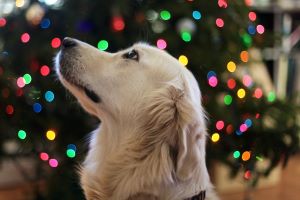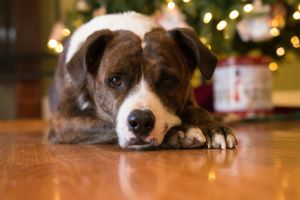
01 Dec Having Guests Over For The Holidays? How to Effectively Prevent & Treat Anxiety in Your Dogs
Anxiety in dogs during holiday gatherings can be distressing. The festivities often bring unfamiliar activities and disruptions that can stress out our furry friends. It’s crucial to manage their anxiety for a peaceful, enjoyable season. This guide offers insights into preventing and addressing dog anxiety during festive gatherings. By understanding their triggers, like loud noises or changes in routine, and implementing strategies such as gradual exposure to guests and providing a safe space, we can create a more relaxed environment for our pets. Prioritizing our dog’s emotional well-being amid the holiday rush ensures a more serene and contented celebration for everyone involved.
Understanding Canine Anxiety
Recognizing Anxiety Signals in Dogs
Anxiety in dogs manifests in diverse behaviors, serving as their way of communicating distress. Keep an eye out for indications such as persistent barking, restlessness through pacing, trembling, or seeking seclusion. Being attentive to these cues enables swift identification and intervention to alleviate their anxiety.
Exploring Causes of Holiday Anxiety in Dogs
Holiday festivities often introduce elements that unsettle our furry companions. Pinpointing triggers like sudden loud noises, unfamiliar faces, or disruptions to their routine sheds light on what specifically induces stress during these celebratory periods. Understanding these factors is pivotal in crafting a stress-reduction strategy.

Preparing Your Dog for Visitors
Gradual Familiarization with Guests
Introducing your dog to guests gradually aids in acclimatization. Short, positive interactions foster a sense of ease and familiarity, mitigating anxiety levels. This method allows your dog to adapt at their own pace, reducing stress associated with sudden social exposure.
Crafting a Safe Retreat
Establishing a dedicated, secure space for your dog away from the bustling activity offers a sanctuary. Equipping this area with their beloved toys, blankets, and items of comfort creates an environment where they feel safe and relaxed amidst the holiday chaos.
Understanding the behavioral cues indicating anxiety, pinpointing triggers, gradual socialization, and providing a secure haven are crucial components in managing your dog’s anxiety during festive gatherings. These steps not only foster their well-being but also contribute to a harmonious holiday experience for both you and your pet.
Strategies During Gatherings
Distraction Techniques
Introduce interactive toys or puzzles to divert your dog’s attention. Treat-dispensing toys or engaging games can keep them occupied and less focused on the commotion.
Controlled Environment
Create a designated space where your dog feels secure. Use barriers or gates to limit their access to areas with high guest traffic, providing a calmer environment.
Positive Reinforcement
Reward calm behavior with treats or praise. Encouraging positive behavior reinforces a sense of security and reassures your dog during social interactions.
Consistent Routine
Maintain your dog’s regular routine as much as possible. Consistency in feeding times, walks, and play sessions helps alleviate stress caused by disruptions.
Time-Out Option
Offer a retreat option for your dog during overwhelming moments. This could be a quiet room or their crate, allowing them to relax away from the excitement.
Human Companionship
Assign a trusted family member or friend to be your dog’s companion. Having a familiar person by their side can provide comfort and support.
Body Language Awareness
Observe your dog’s body language closely. Understanding their signals helps in gauging their comfort level and addressing anxiety promptly.
Vet Consultation
Seek advice from a veterinarian for additional strategies. They may recommend specific techniques, products and/or anxio-lytic medications tailored to your dog’s needs and medical history.
Remember, each dog is unique, so it’s essential to try different strategies and observe what works best for your furry friend during gatherings.

Interacting with Guests When Your Dog is Present
Educating Guests on Canine Behavior
Informing Visitors about Your Dog’s Needs and Boundaries:
Educating guests about your dog’s behavior sets the stage for a harmonious gathering. Share essential information about your dog’s preferences, like whether they enjoy being petted or if they need space. Highlight boundaries, such as avoiding sudden movements or loud noises that might startle your furry friend.
Encouraging Calm Interaction for Your Dog’s Comfort:
Encouraging guests to approach your dog calmly and gently fosters a positive atmosphere. Suggest they avoid prolonged eye contact or hovering, as these actions might make your pet anxious. Emphasize the importance of letting your dog approach them first to establish comfort.
Supervising Guest Interactions
Monitoring and Guiding Interactions:
Keep a watchful eye on interactions between guests and your dog. Offer gentle guidance to visitors on the appropriate way to engage with your pet. Show them the best methods for petting or playing, emphasizing the importance of respecting your dog’s cues.
Ensuring a Safe and Positive Environment:
Your vigilant supervision ensures a safe environment for both guests and your dog. Step in if interactions seem uncomfortable or if your dog displays signs of stress. Redirect interactions positively to maintain a stress-free atmosphere for everyone involved.
By educating guests about your dog’s behavior and supervising interactions, you create an environment where both your pet and visitors feel comfortable and secure during holiday gatherings. This proactive approach fosters positive experiences and prevents potential stress or discomfort for your furry companion.
FAQs About Managing Anxiety in Dogs During Gatherings
Q: How long can anxiety last in dogs during gatherings?
A: Anxiety duration varies widely among dogs. Some may quickly recover, while others might take several hours to calm down. It’s important to observe your dog’s behavior and offer support as needed, understanding that each pet responds differently to stress.
Q: Can I medicate my dog for holiday anxiety?
A: It’s crucial to consult your vet before considering any medication for your dog’s anxiety. They can suggest appropriate remedies or supplements tailored to your dog’s specific needs. Avoid self-medicating your pet without professional guidance.

Q: Should I alter my dog’s diet during gatherings?
A: Maintaining your dog’s regular diet during gatherings is recommended. Abrupt changes can upset their stomach and contribute to heightened stress. Consistency in their diet provides comfort and stability, aiding in anxiety reduction.
Q: Can I use essential oils to calm my dog?
A: Some essential oils have calming properties, but their use should be approached cautiously. Always consult your vet to ensure the oils are pet-safe and properly diluted. Incorrect use may lead to adverse reactions in your dog.
Q: Is crate training helpful for anxious dogs?
A: Crates can serve as safe spaces for dogs comfortable with them. However, successful crate use requires patience and positive training methods. Gradually introducing and associating the crate with positivity is key to its effectiveness.
Q: How can I support my dog post-gathering?
A: Post-gathering support is vital for your dog’s well-being. Create a calm environment, engage in relaxing activities together, and provide reassurance. This helps your dog transition back to a relaxed state after the excitement of a gathering.
Always Seek Help When Needed
Adeptly handling your dog’s anxiety amidst holiday gatherings is instrumental in crafting a serene and joyous celebration for both you and your beloved furry companion. Employing these tailored strategies, comprehending their unique needs, and proactively addressing triggers contribute significantly to fostering a relaxed atmosphere. Your commitment to recognizing their cues, whether through gradual exposure techniques or the provision of safe havens, forms the bedrock of a stress-free environment. Prioritizing your dog’s well-being by ensuring a calm post-event ambiance, maintaining routine, and offering continuous support underscores the importance of their emotional comfort. Ultimately, this dedicated approach not only enhances your dog’s overall experience but enriches the festive occasion for everyone involved, culminating in a truly enjoyable and harmonious celebration.
If you think your dog is experiencing any health concerns at all don’t hesitate to visit Stat Vet today. While Stat Vet can’t replace your regular vet for care, we are open on nights and weekends and for any urgent care needs you may have for your dog or cat.

